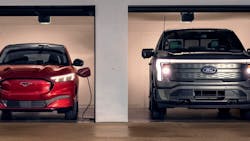Ford Leans Into More ‘Surgical’ Approach to EV Growth
“We want that scaling benefit, but that is not success.”
Ford Motor Co. CEO Jim Farley on May 2 told analysts and investors that the auto giant will become more “surgical” in its approach to the electric-vehicle market and will, as various competitors have said they also plan to, hone in on software and other technologies as profit drivers.
“The thing that I look for as a CEO is not necessarily just the volume growth. It's actually how fast we use the data off the vehicle to make the customer’s software experience better,” Farley said on a conference call discussing Ford’s first-quarter results. “To me, the quickness of that loop is the fitness for differentiating brand and profit in the future.”
The leaders of Dearborn-based Ford have previously committed to cranking out 2 million EVs by late 2026, and the automaker is investing heavily in the United States and Canada to get there. But, pressed repeatedly about managing production volumes while building an EV business, Farley said on the call that his team plans to “not grow at any cost.” One early manifestation of that: The company will cut back on its investments in China to focus on its commercial business and its joint venture with Jiangling Motors Corp.
“We have a source of a fantastic affordable EVs and commercial ICE products with JMC,” Farley said. “That’s an example of how we're going to approach China from now on. We’re not going to try to serve everyone. It will be a lower-investment, leaner, much more focused business.”
In the first three months of 2023, Ford produced a net profit of nearly $1.8 billion, reversing a big year-ago loss due to one-time charges associated with the massive stock price declines of Rivian, the electric truck manufacturer in which Ford as an early investor. Adjusted EBIT climbed to nearly $3.4 billion from $2.3 billion in early 2022 while revenues surged to $41.5 billion from $34.5 billion. EBIT from the company’s internal-combustion Ford Blue division nearly doubled to $2.6 billion while its commercially focused Ford Pro group nearly tripled EBIT to $1.4 billion thanks in part to wholesales climbing 18% to 337,000.
Despite facing some higher-than-expected input costs—CFO John Lawler cited sticky commodity costs as a factor in 2023 savings tracking lower than previously expected—Ford’s leaders also have reiterated their full-year guidance for earnings, cash flow and capital spending. That’s despite their expectation that pricing pressures for both ICE vehicles and EVs will intensify as the year goes on.
Shares of Ford (Ticker: F) were up more than 1% to about $12 in morning trading May 3. Over the past six months, they have lost about 10% of their value, shrinking the company’s market capitalization to about $48 billion.
About the Author
Geert De Lombaerde
Senior Editor
A native of Belgium, Geert De Lombaerde has been in business journalism since the mid-1990s and writes about public companies, markets and economic trends for Endeavor Business Media publications, focusing on IndustryWeek, FleetOwner, Oil & Gas Journal, T&D World and Healthcare Innovation. He also curates the twice-monthly Market Moves Strategy newsletter that showcases Endeavor stories on strategy, leadership and investment and contributes to other Market Moves newsletters.
With a degree in journalism from the University of Missouri, he began his reporting career at the Business Courier in Cincinnati in 1997, initially covering retail and the courts before shifting to banking, insurance and investing. He later was managing editor and editor of the Nashville Business Journal before being named editor of the Nashville Post in early 2008. He led a team that helped grow the Post's online traffic more than fivefold before joining Endeavor in September 2021.
